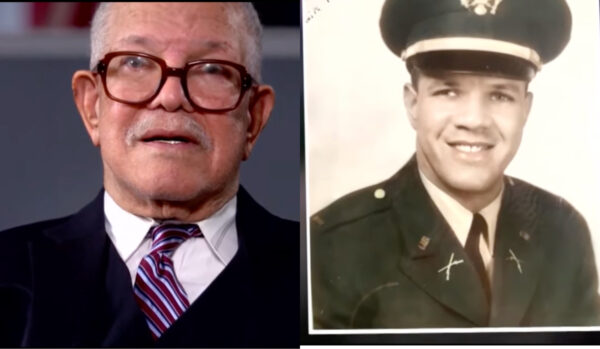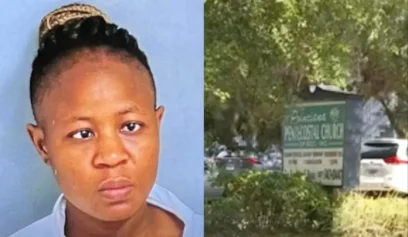After years of petitioning for the re-consideration of an award he was robbed of in the 1960s, a Black Vietnam veteran who served as one of the nation’s first African-Americans in the military to be included in the Army’s Special Forces will receive the nation’s highest honor for a serviceman.
On Monday, Feb. 13, President Joe Biden made the call that righted this 60-year historical wrong, calling retired U.S. Army Col. Paris Davis to share with him that he will now receive the United States Medal of Honor.
The White House took to social media to talk about the moment the president reached out to Davis. On Instagram, his team wrote, “Today, President Biden called Ret. U.S. Army Colonel Paris Davis to inform him that he will receive the Medal of Honor for his remarkable heroism during the Vietnam War.”

“This Medal of Honor will be awarded following recommendations by the Secretary of the Army and the Secretary of Defense. @potus told Colonel Davis that he looks forward to hosting him at the White House soon for a medal presentation,” the post continued.
“The president told Col. Davis that he looks forward to hosting him at the White House soon for a medal presentation,” the White House press office said.
Two years ago, Davis appeared on CBS News and made public how he was on track to receive the award back in 1965, at the height of the civil rights movement and the dismantling of America’s segregationist system of Jim Crow, but the paperwork for the Medal of Honor mysteriously vanished.
Col. Davis said the call from the president “prompted a wave of memories of the men and women I served with in Vietnam — from the members of 5th Special Forces Group and other U.S. military units to the doctors and nurses who cared for our wounded.”
“I am so very grateful for my family and friends within the military and elsewhere who kept alive the story of A-team, A-321 at Camp Bong Son,” he continued. “I think often of those fateful 19 hours on June 18, 1965, and what our team did to make sure we left no man behind on that battlefield.”
CBS News reports it is unusual for someone to have been overlooked, according to military historian Doug Sterner.
Sterner, who served two tours in Vietnam, has written 108 books on service medals.
“This is a veteran, a war hero, who was submitted for our nation’s highest honor, and the paperwork for that award was actually lost. The military is redundant in paperwork, if nothing else. And so, it’s very rare for that to occur,” Sterner told CBS.
Davis as an officer, was exceptional. On June 18, 1965, the 26-year-old Army captain led a 19-hour raid in Bồng Sơn in the Binh Dinh province of South Vietnam. Davis remembered that engagement, saying, “We were stacking bodies the way you do canned goods in a grocery store.”
At first, Davis and his team were successful, but a major enemy counterattack wounded every American fighting.
According to his account, he and his fellow soldiers were being hit by grenades and gunfire in all different kinds of ways. Two American soldiers, Billy Waugh and Robert Brown were injured in the melee. Brown was shot in the head.
Davis said in a 1969 interview with Phil Donahue he was ordered to leave twice but would not go. He disobeyed his higher-ups even though he himself was injured.
The Army Times reports Davis “rescued each member of his team. He sprinted into an open rice paddy repeatedly to retrieve each of them, firing his rifle with his little finger after an enemy grenade shattered his hand.” The Army said Davis saved his entire team.
“Sir, I’m just not going to leave. I still have an American out there,” he told his authorities.
In April 2021, Billy Waugh, who was then 91 years old and had been shot several times in the legs during the Vietnam attack and could not walk, said, “We ended up in an open area together. He [Davis] grabbed me, and he [dragged] me.”
Waugh submitted the original paperwork for the Black man to receive the Medal of Honor award. Because of Davis’ self-sacrifice and choosing not to abandon him, Waugh was able to go on to have careers in both the Special Forces and the CIA.
Billy Cole, Davis’ commander during his time in Vietnam, also recommended Davis for the medal, but according to the Defense Department, the paperwork disappeared, and in 1969, “did not reveal any file on Davis.”
A military hearing was held to determine the status of the Davis Medal of Honor nomination. The U.S. Army was ordered to submit a new packet “ASAP” for Davis. However, like the first time, no evidence that a Medal of Honor application was on file.
This would happen for the third time in 1981.
According to Waugh, he wrote a personal note with the application that said, “I wanted to redo it, to see why it hadn’t gone.”
Adding, “I only have to close my eyes to vividly recall the gallantry of this individual.”
When asked why he thought it had taken so long for him to receive the honor, even with so many people advocating on his behalf, in 2021, Davis said, “I know race was a factor.”
Ron Deis, who served under Davis in 1965 as one of the youngest soldiers, agrees. Deis, who also pushed for this honor for decades, told the New York Times, “What other assumption can you make? We all knew he deserved it then. … He sure as hell deserves it now.”
This time around, Army Secretary Christine Wormuth and Defense Secretary Lloyd T. Austin III submitted his name for consideration, leading to the breakthrough.


